
|
Sale 86
The Manuscripts, Collectibles & Space Auction
| The William K. Steiner Collection - Colonial & Revolutionary America |
| |
| |
| Lot |
Photo |
Description |
Realized |
Lot 270 |
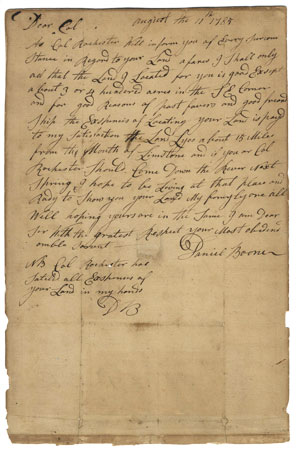 |
Boone, Daniel (1734-1820) American frontiersman and folk hero. Autograph letter signed ("Daniel Boone"), and initialed ("D B"), one page, 12½ x 8 1/8 in., no place, August 11, 1785. To Thomas Hart in Hagerstown, Maryland. Docketed on verso; silked on verso and mounted on paper, very toned; marginal chipping and fraying.
Boone writes to his friend and business partner, Thomas Hart, regarding a plot of land he has located for Hart in the same area Boone himself would settle in 1786. He describes the plot of land, near Limestone, Kentucky: "Dear Col. / A Col Rochester will inform you of Every surcomstance in Regard to your Land afares. I shall only ad that the Land I Located for you is good Exsept about 3 or 4 hundered acres in the SE Corner….the Land Lyes about 15 Miles from the Mouth of Limstone and if you or Col Rochester should come Down the River Next Spring I hope to be Living at that place and R[e]ady to show you your Land. My famyly are all Well hoping yours are in the Same. I am Dear Sir with the gratest Respect…." Boone confirms that their mutual friend and business partner, Colonel (Nathaniel) Rochester (after whom Rochester, New York was named) has settled all Boone's expenses for Hart's land.
Estimated Value $10,000 - 12,500.
View details and enlarged photo
| Realized
$9,900 |
Lot 271 |
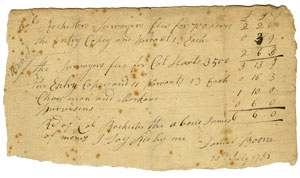 |
Boone, Daniel and Rebecca. Autograph document signed ("Daniel Boone"), 1 page, 4½ x 8 in., no place, but probably in present day Maysville, Kentucky, an Ohio River Port, July 30, 1785. Invoice to Colonel Rochester for surveying his lands and those of Colonel Harts plus "markers" and "provisions."
With document signed ("Reback Boon"), 1 page, 5 x 8¼ in., no place, "this 2nd Day of April, 1796." Countersigned by Thomas Gray and James Horsby. A notice of consent for the marriage of her daughter: "This is to Certify that I, Rebekah Boon Have Give my free Concent that my Daughter Polley Lock may enter into Wedlock with Morton Coonce this given from under my hand and Seale this 2nd Day of April, 1796. Reback Boon." Addressed on the verso "To the Clarke of Jefferson County."An extremely unusual document.
Daniel (1734-1820) and Rebecca Boone (1739-1813) had ten children including Enoch, the first white child born in Kentucky. There are a myriad of stories about this great pioneer frontiersman and his fights with both Indians, fellow settlers, and the government. On July 4, 1776, Boone's daughter Jemima was captured with two of her friends, by Shawnees outside of Boonesborough. Boone and several settlers from the town pursued the Indians, finally catching up with them, rescuing the girls from their captors. This was probably the most celebrated story of Boone's life, and it appeared as a fictionalized episode in James Fenimore Cooper's Book, The Last of the Mohicans.
Estimated Value $8,500 - 10,000.
View details and enlarged photos
| Realized
$7,800 |
Lot 272 |
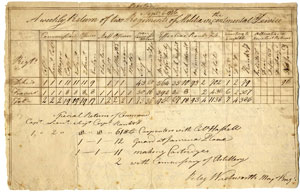 |
1776 Weekly Continental Return, Boston. Document signed by Peter Wadsworth, Major of the Brigade, 1 page, 8 x 12½ in., Boston, Sept. 6, 1776. "A weekly Return of two Regiments of Militia in the continental Service." The two regiments are Dike's Regt. and Francis' Regt. Categories listed include commissioned officers, staff officers, non-commissioned officers, and "Effective Rank & File." Notably since the last return, no men have enlisted, none are dead, none departed or discharged, but 96 cannot be found. Paper was obviously scarce since the return is written on the verso of a letter.
Estimated Value $500 - 1,000.
View details and enlarged photo
| Realized
$630 |
Lot 273 |
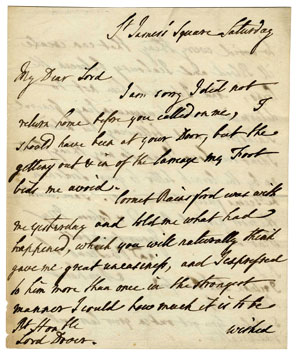 |
Amherst, Jeffery, 1st Baron Amherst (1717-1797) Commander-in-Chief of British Forces in America during the French and Indian War; first British Governor General in the territories that eventually became Canada. Autograph letter signed ("Amherst"), 2 pages, 8¾ x 7¼ in., St. James's Square, no date (c. 1744-46). To Lord Dover, expressing uneasiness about problems between army members. In part: "Cornet Rainsford was with me yesterday and told me what had happened, which you will rationally think gave me great uneasiness, and I expressed to him more than once in the strongest manner I could how much it is to be wished to avoid every thing that can create ill Blood and Jealousy between the Corps…." He writes that he advised Cornet Rainsford not to do anything without talking to his uncle, General Rainsford, and to follow his advice, then continues, "I don't see how I can do any thing further…he seems fully determined…."
Due to the influence of his uncle, General Charles Rainsford (died 1778), after whom he was named, Charles Rainsford (1728-1809) was appointed second cornet in General Bland's 3rd dragoons in March 1744 and was active in the Flanders theatre of the War of the Austrian Succession. He had already been promoted by the time he returned to England to help put down the Jacobite uprising (1745-46), so this letter was probably written between 1744-46.
Estimated Value $400 - 600.
R.M. Smythe, June 6, 1996, lot 308.
View details and enlarged photos
| Realized
$500 |
Lot 274 |
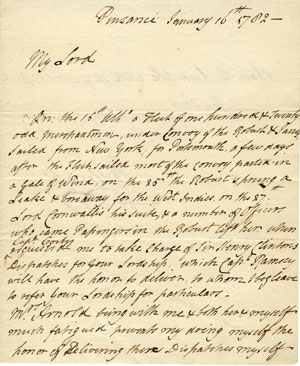 |
Arnold, Benedict (1741-1801) American Revolutionary War General and hero of the battle of Saratoga. In July 1780, after he was given command of West Point by General Washington, Arnold made plans to surrender West Point to the British for the price of 20,000 pounds. The plot was exposed when Arnold's liaison with the British, Major John André, was captured with a pass from Arnold and the plans in his boot. Arnold narrowly escaped and Major André was hanged. Arnold was commissioned a brigadier general in the British army and led raids in Virginia and Connecticut. After Cornwallis' surrender at Yorktown, Arnold received permission from Sir Henry Clinton to go to England, and Arnold and his family left on December 8, 1781.
Revolutionary War-date autograph letter signed ("B Arnold"), 1½ pages, 9 x 7¼ in., Penzance, January 16, 1782. To an unknown correspondent [possibly Lord Germain] regarding the delivery of dispatches from Sir Henry Clinton. Integral leaf with docket is separated from the letter, which is boldly penned and signed.
Arnold writes: "On the 15th Ulto. a Fleet of one hundred & twenty odd Merchantmen, under Convoy of the Robust & James sailed from New York for Portsmouth, a few days after the Fleet sailed most of the convoy parted in a gale of wind, on the 25th the Robust sprung a Leake & bore away for the West Indies, on the 27th. Lord Cornwallis…& a number of Officers who came Passengers in the Robust left her, when Capt. Corby requested me to take charge of Sir Henry Clintons Dispatches for your Lordship, which Capt. Ramsey will have the honor to deliver, to whom I beg leave to refer Your Lordship for particulars." Clinton, with whom Arnold had plotted treason, had resigned as commander of the British forces in North America in May 1781.
Arnold concludes: "Mrs. Arnold being with me & both her & myself much fatigued prevents my doing myself the honor of Delivering these Dispatches for myself." Although Arnold argued for the continuance of the war, the party of North and Germain lost power, and those who followed wanted to end the long and costly war. Arnold lived in England for the rest of his life except for the years 1787-1791, when he lived in St. John, New Brunswick. He died persona non grata by both the Americans and the British.
Estimated Value $6,000 - 8,000.
Sotheby's New York, Nov. 1, 1993, lot 14.
View details and enlarged photos
| Realized
$6,900 |
Lot 275 |
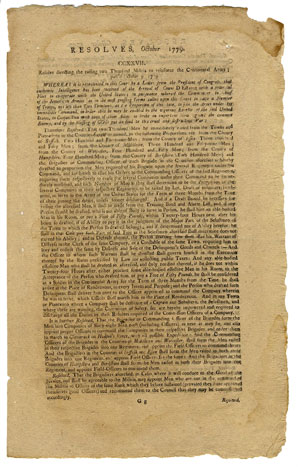 |
Continental Congress Printed Resolve For Raising Militia. Folio page from a printed tome of Resolves, Philadelphia, October 1779. One year before Yorktown, George Washington orders another 2000 militia to reinforce the Continental Army. In part: "Whereas it is represented to this court by a letter from the President of Congress, that authentic intelligence has been received of the arrival of Count D'Estaing with a powerful fleet to cooperate with the United States; in pursuance whereof the Commander-in-Chief of the American armies has in the most pressing terms called upon this court to raise a number of troops, no less than 2000 to strike an important blow against the common enemy and put an end to this cruel and destructive war…." Moderate browning, waterstains in margins, not affecting text. An excellent association piece.
Estimated Value $400 - 600.
View details and enlarged photo
| Realized
$288 |
Lot 276 |
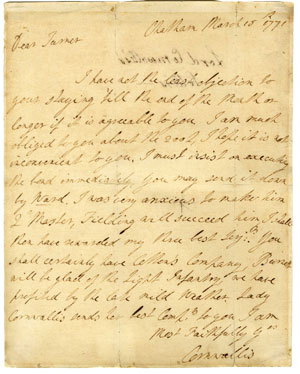 |
Cornwallis, Charles, 1st Marquess Cornwallis (1738-1805) British Army officer and colonial administrator, best known for surrendering to American and French forces at Yorktown on October 19, 1781, which ended major fighting in the American Revolutionary War. Peace negotiations began in 1782, and on September 3, 1783, the Treaty of Paris was signed, formally recognizing the United States as a free and independent nation. Autograph letter signed ("Cornwallis"), one page, 9¼ x 7¼ in., Chatham, March 15, 1771. To "Dear Turner," "…I am much obliged to you about the 200£, I hope it is not inconvenient for you. I must insist on executing the bond immediately, you may send it down by Ward. I was very anxious to make him Qr Master, Fielding will succeed him, I shall then have rewarded my three best serj:s. You shall certainly have Celler's company, Burnett will be glad of the Light Infantry, we have profited by the late mild weather. Lady Cornwallis sends her best Comp:s to you…." Cornwallis was Colonel of the 33rd Regiment of Foot from 1766 until 1805. Letter has been backed for conservation; toning and soiling; one closed vertical tear runs through the first "l" in "Cornwallis." Accompanied by an engraving.
Estimated Value $400 - 600.
View details and enlarged photos
| Realized
$600 |
Lot 277 |
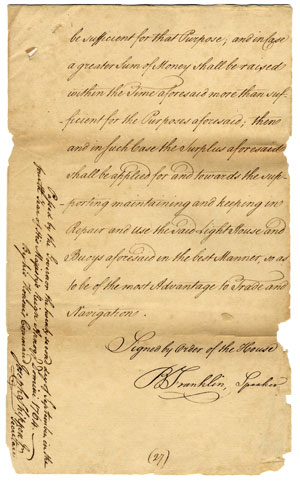 |
Franklin, Benjamin and John Penn. Document signed ("B Franklin, Speaker") as Speaker of the Assembly, and ("John Penn") as Governor of Pennsylvania, 27 pages, 12½ x 7 5/8 in., Sept, 22, 1764. Also signed by Joseph Shippen, Jr. as Secretary of Pennsylvania. "A Supplement to the Act entitled An Act for erecting a Light House at the Mouth of the Bay of Delaware at or near Cape Henlopen, and for placing and fixing Buoys in the said Bay & River Delaware." Ribbon which bound the pages is missing. Beautifully-penned pages are written on laid watermarked paper, which are toned with minor stains. Page 1, signed by John Penn (1729-1795) who was grandson of Pennsylvania founder William Penn and the last governor of colonial Pennsylvania (1763-71 and 1773-76), has scattered stains and chipping. Page 27, signed by Franklin, has a partial split at lower fold and numerous edge chips, not affecting Franklin's wonderful, bold signature. Accompanied by a 7½ x 5½ in. engraving of Franklin in his coon-skin hat, an image much loved by the French, with French title: "Born in Boston, in New England January 17, 1706"; in 1790, the French National Assembly declared three days of mourning when news of Franklin's death arrived. Franklin was one of America's leading founding fathers, Signer of the Declaration of Independence and the U.S. Constitution, as well as an inventor, a politician, and a diplomat.
Estimated Value $6,000 - 8,000.
View details and enlarged photos
| Realized
$13,125 |
Lot 278 |
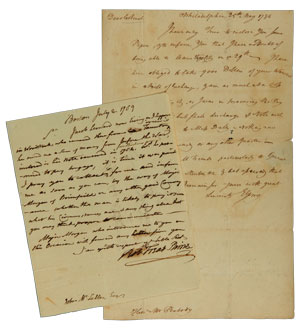 |
Gerry, Elbridge and Robert Treat Paine. Revolutionary War-date autograph letter signed ("E Gerry"), one page, 12 x 7½ in., Philadelphia, May 25, 1780. To Nathaniel Peabody, "Member of Committee of Congress at Head Quarters Morris Town." "Dear Colonel / I have only Time to inclose you some Papers, & to inform you that I have no Doubt of being able to leave this City on ye 29th. I have been obliged to take 9000 Dollars of your Warrant in a Bill of Exchange, I am as much at a loss for negotiating it, as I was in procuring the Payment thereof; but shall discharge ye Note which you have given to Messr. Daley….Remember me to all Friends particularly to General Schuyler, Baron Steuben &c…." Laid paper has a couple of small holes in text; address leaf has more. Elbridge (1744-1814) signed the Declaration of Independence and served as the fifth Vice President of the United States (1813-1814) under James Madison. He is known best for being the namesake of gerrymandering, a process by which electoral districts are drawn with the aim of aiding the party in power.
Together with an autograph letter signed ("Robt. Treat Paine"), one page, 7¾ x 6½ in., Boston, July 2, 1789. To John McLellen, Esqr., asking him to collect a sum of money from Jacob Lerman ("now living as I suppose in Woodstock") which was due Paine "from before the War." He encloses the note for the money due and asks McClellen to let him know by way of Major Morgan "whether the man is likely to pay it soon, what his Circumstances are, & any thing else that you may think proper to communicate…." Some contemporary ink smearing, else boldly penned and signed on laid, watermarked paper. Robert Treat Paine (1731-1814) was a Massachusetts lawyer and politician, best known as a signer of the Declaration of Independence.
Estimated Value $2,500 - 3,500.
Christie's, New York, Dec. 9, 1998, lot 129.
View details and enlarged photo
| Realized
$1,620 |
Lot 279 |
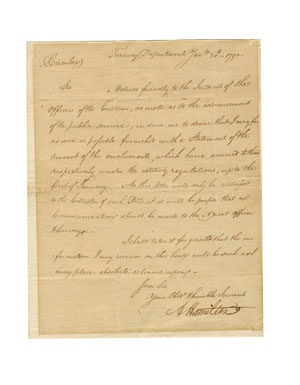 |
Hamilton, Alexander (1755-1804) Founding Father; secretary and aide-de-camp to Washington; member of the Continental Congress; one of three authors of The Federalist Papers; signer of the U.S. Constitution; 1st U.S. Secretary of the Treasury; leader of the Federalists. He was killed in a duel with Aaron Burr. Letter signed ("A. Hamilton") as Secretary of the Treasury, 1 page, 9 x 7 in., Treasury Department, January 20, 1790. A circular letter to be printed and sent to the customs Collectors at each port desiring " that I may be as soon as possible furnished with a Statement of the amount of the emoluments, which have accrued to them respectively under the existing regulations up to the first of January…" Affixed to card stock using outermost corner tips, three of which are stuck to the card but present.
Estimated Value $5,500 - 7,000.
Christie's New York, Dec 9, 1994, lot 43.
View details and enlarged photo
| Realized
$3,480 |
Lot 280 |
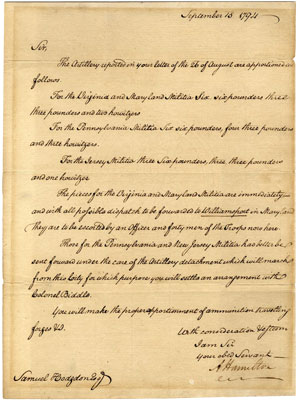 |
Hamilton, Alexander. Letter signed ("A.Hamilton"), as Secretary of the Treasury, 1 page, 10¾ x 8 in., September 15, 1794. To Samuel Hodgdon. Writing the Superintendent of military stores concerning the distribution of artillery for the Pennsylvania, New Jersey, Maryland, and Virginia militias. Slight browning, folds reinforced. With a steel engraving of Hamilton.
Estimated Value $2,500 - 3,000.
Laird U. Park Americana Library Collection, Sotheby's New York, November 29, 2000, lot 250.
View details and enlarged photo
| Realized
$3,720 |
Lot 281 |
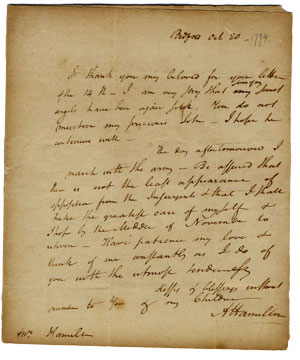 |
Hamilton, Alexander. Autograph letter signed ("A Hamilton"), 1 page with integral address leaf, 7½ x 6¼ in., Bedford (Pa.) Oct. 20, n.y. (1794). Overall toning. To Mrs. Hamilton during the Whiskey Rebellion: "I thank you my beloved for your letter of the 14th. I am very sorry that some of my sweet angels have been again sick. You do not mention precious John--I hope he continues well. The day after tomorrow I march with the army. Be assured that there is not the least appearance of opposition from the insurgents & that I shall take the greatest care of myself & I hope by the Middle of November to return. Have patience my love & think of me constantly as I do of you with the utmost tenderness. Kisses & blessings without number to you & my Children."
In 1791, as a means to help retire the national debt, Treasury Secretary Alexander Hamilton implemented an excise tax on domestically-produced distilled spirits. Farmers in the Western Pennsylvania, many of them Scots-Irish, were desperately poor and saw the tax as an assault on their liberty. They, in turn, assaulted the tax collectors, and in July 1794, burned the home, barn, and slave quarters of the chief excise collector, John Neville, a former Revolutionary War general and childhood friend of George Washington. President Washington called out a militia of some 13,000 men and personally led them to Bedford, Pennsylvania, where he turned them over to General Henry "Light Horse" Lee. Hamilton accompanied the troops, but by the time the army arrived in Pittsburgh, the rebels had gone home. Approximately 150 men were arrested and tried for treason but lack of evidence and witnesses hampered the trials. Two men, John Mitchell and Philip Weigel, were found guilty of treason but were subsequently pardoned by President Washington.
Estimated Value $2,000 - 3,000.
View details and enlarged photo
| Realized
$10,200 |
Lot 282 |
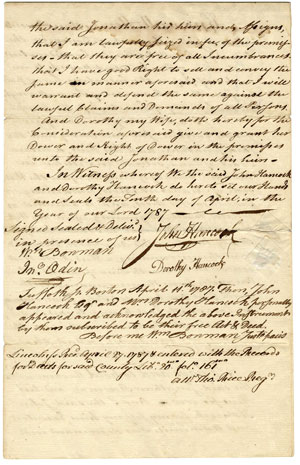 |
Hancock, John (1737-1793) Founding Father; President of the Continental Congress; Signer of the Declaration of Independence; Governor of Massachusetts. Document signed ("John Hancock"), 2 pages, 11¾ x 7½ in., Boston, April 10, 1787. Also signed by his wife, Dorothy Hancock. The sale of "a certain tract of land situate in Pittston in the said county of Lincoln upon the West side of Kennebeck River containing two hundred acres…for the sum of five hundred pounds to me…"
Hancock's signature is the most famous signature in American history. It is said when asked why he made his signature so large on the Declaration, Hancock replied "so the King can readily see it!" When Franklin met with Lord Howe on Staten Island in September of 1776 in an effort for peace, Howe said that the colonies could return to the way things were before hostilities with one caveat--they must surrender John Hancock and Samuel Adams. Hancock spent most of the war moving about and hiding from the British as there was a huge price on his head.
Estimated Value $2,500 - 3,000.
View details and enlarged photos
| Realized
$6,000 |
Lot 283 |
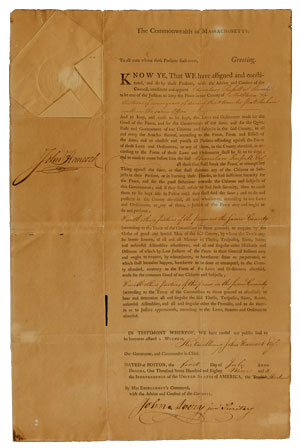 |
Hancock, John (1737-1793) Founding Father; first Signer of the Declaration of Independence. Partly-printed document signed as Governor of Massachusetts, 1 page, laid paper, 17 x 11 in., Boston, July 1, 1789. Appointing Chambers Russell a justice of the peace for Middlesex County. Countersigned by John Avery, Secretary. Paper is toned and brittle; archival repairs on verso. The signature is a particularly lovely example, written at top left under the paper seal.
Estimated Value $2,000 - 3,000.
View details and enlarged photo
| Realized
$3,360 |
Lot 284 |
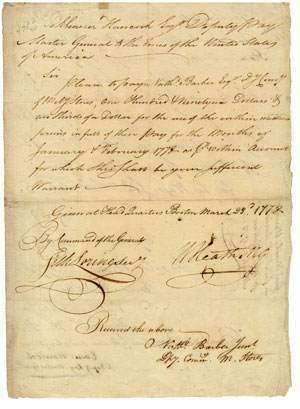 |
Heath, William (1737-1814) Major General in the Continental Army; reprimanded by Washington for his handling of the attack on Fort Independence (1777); commanded Eastern Department (1777-79) and in the Hudson Valley (1779-81). Manuscript document signed ("W Heath MG"), 2 pages, 11½ x 8¼ in., Boston, March 23, 1778. To Thomas Hancock, Deputy Paymaster General of the Forces of the United States of America, ordering him to pay Nathaniel Barber, Deputy Commisisary of Military Stores, the sum of $196 for four soldiers' wages. The account of the men is stated on the verso, with signed endorsements by Nathaniel Barber and Ebenezer Hancock, Deputy Paymaster General. An interesting financial document from the American Revolution.
Estimated Value $300 - 400.
Superior Galleries, Nov. 6, 1993, lot 46.
View details and enlarged photo
| Realized
$456 |
Lot 285 |
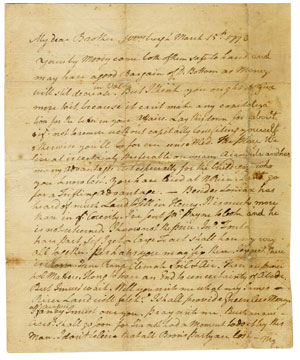 |
Henry, Patrick (1736-1799) Revolutionary statesman and Virginia Governor; best remembered for his fiery speech in front of the House of Burgesses where he declared, "Give me liberty or give me death!"
Autograph letter signed, 2 full pages, 9 x 7½ in., Williamsburgh (Virginia), March 15, 1778. Written as Governor of Virginia to his brother, Henry. Letter has professional restorations; paper at right margin was replaced and missing words added. In this important and rare letter, the great patriot gives financial advice to his brother, as well as his opinion on the war: "Yours by Moody came both of them safe to hand may have a good bargain of D. Bottom as Money will still decrease in value. But I think you ought to give more to it, because it can't make any capitilization for the better in your affairs. Lay this down for about viz. not to remove without capitally benefiting yourself otherwise you'll be forever unsettled. The place we live at is certainly preferable on many accounts and has many advantages especially for the children who you know best….Don't go for Trifling Advantages- Besides Lomax has heard of much Land to sell in Henry…I've sent Jno. Payne to look and he has not returned. I know not the price…if I get a large Tract shall have my way altogether….I expect there is room…to have an end of uncertainty of abode. But I must wait. Will you risk me what my James River Land will fetch? I shall provide Greenless Money…fancy I must owe you. Pray write me…I shall go soon for I've not a moment to do it by this man. I don't believe that all [Daniel] Boon's party are lost - my dear wife says she has enquired for the Shoes but at present I do not hear of any but will secure them as soon as possible…I'm offered £4000 for some…and some Neg[roe]s but shall take no less than 5000. Negroes rise price with that fellows are £300. Most people talk of the war with England. The most wise proposal will be made to gain time & then attack them with great Reinforcements. Several ships arrive from France with goods which keep up yet. The News they bring us is important. The French are very friendly…"
In late 1777, the American defeated the British at Saratoga, convincing the French to enter the war to help America; by early 1778, their assistance had begun. Daniel Boone fought on the Western frontier and in 1778, was captured by the Shawnee and held captive for four months; Henry makes reference to this in this letter. Henry handwritten letters with content are extremely rare.
Estimated Value $6,000 - 7,000.
Scott Winslow, July 8, 1998, lot 296.
View details and enlarged photos
| Realized
$5,520 |
Lot 286 |
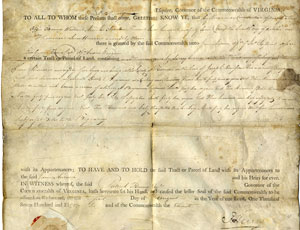 |
Henry, Patrick. Document signed ("P. Henry") as Governor of Virginia, 1 page, vellum, Richmond, August 1, 1785. A land grant of 1,000 acres to James Anderson in Harrison County. Vellum is stained and foxed; a few small holes in vertical fold. Small paper and wax seal is present at lower left and Patrick Henry's signature is slightly faded but completely legible.
Estimated Value $600 - 800.
View details and enlarged photo
| Realized
$960 |
Lot 287 |
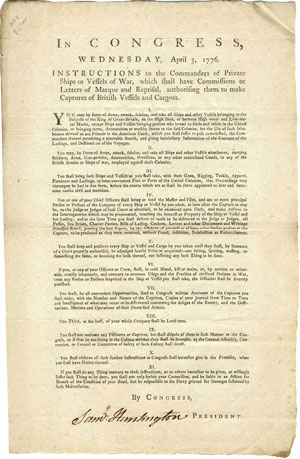 |
Huntington, Samuel (1731-1796) American patriot who signed the Declaration of Independence and the Articles of Confederation, served as President of the Continental Congress, Chief Justice of the Connecticut Supreme Court, and Governor of Connecticut. Printed broadside signed ("Saml Huntington") as President of the Continental Congress, probably 1779-1780; 1 page, 13 x 8 ½ in. Headed "In Congress, Wednesday, April 3, 1776. Instructions to the Commanders of Private Vessels of War, whish shall have Commissions or Letters of Marque and Reprisal, authorising them to make Captures of British Vessels and Cargoes." A bright fresh copy with a bold signature of Huntington, President of the Continental Congress. Printed by John Dunlap, Philadelphia, 1776; Dunlap is credited with the first printing of the Declaration. Evans 15137.
This is in essence a license for naval vessels to attack and pillage. Congress had Dunlap prepare two documents date April 3, 1776 for privateers, one being the actual commission and the present piece giving detailed instructions as to the extent American vessels could seize, destroy, and vandalize the British Navy. Both were signed by Huntington as President of the Congress. According to Evans, the present printed form was reprinted and in use as late as 1780. Samuel Huntington represented Connecticut in Congress from 1775 until 1784; he signed the Declaration during that period and was chosen to succeed John Jay as President in 1779, so this document was probably signed between 1779-1780.
Privateers were ships owned by private parties, authorized by Congress under a letter of Marque to carry out operations of war. It was a very lucrative business. Between 1775 and 1785, as allowed by the official act of Congress delineated in this document, American privateers captured and/or destroyed about 600 British vessels, including 16 men of war, with goods and valuables amounting to an estimated $18,000,000.00.
This is an extremely rare document with Evans locating only one other, that being the Library of Congress copy.
Estimated Value $6,000 - 8,000.
View details and enlarged photo
| Realized
$7,200 |
Lot 288 |
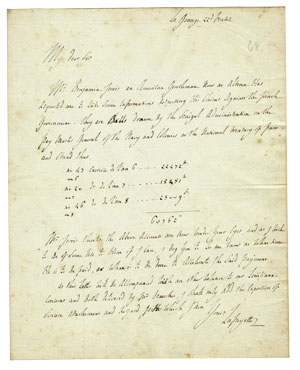 |
Lafayette, Marquis de (1757-1834) French aristocrat, soldier, statesman, and close friend of General George Washington. He was a general in the American Revolution and played an important role in the French Revolution of 1789 and the July Revolution of 1830. Autograph letter signed ("Lafayette"), in English, 2 pages, 9 x 7¼ in., La Grange, February 22, no year. Integral leaf is mounted at left edge to a slightly larger sheet; light toning and foxing. To an unidentified recipient, in part: Mr. Benjamin Jervis, an American gentleman now in Altona has requested me to take some information respecting his claims against the French Government. They are…drawn…on the pay master general of the Navy and Colonies at the National Treasury of Paris…." He lists claims amounting to 60,762 francs and asks to be informed when and where Mr. Jervis is to be paid. Lafayette then alludes to another letter (not present) which is being enclosed in the same packet which is "relative to our Louisiana concerns."
Estimated Value $800 - 1,000.
View details and enlarged photo
| Realized
$1,500 |
Lot 289 |
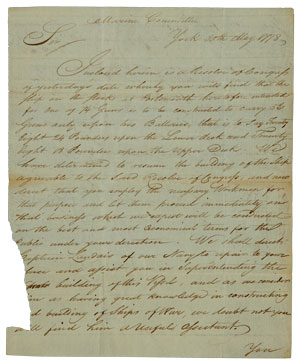 |
Lee, Richard Henry (1732-94) Signer of the Declaration of Independence from Virginia. Lee was a delegate to the Continental Congress from 1774 to 1779. On June 7, 1776, he moved the resolution (seconded by John Adams) that led directly to the writing of the Declaration of Independence, which he signed, as well as the Articles of Confederation. He was in the Congress again from 1784 to 1789, serving as President 1784-85. From 1789 to 1792 he was a member of the U.S. Senate.
Revolutionary War-date letter signed ("Richard Henry Lee C.M.C."), 2 pages (single sheet), 9¼ x 7½ in., York, May 30, 1778. Paper loss at margin affects a few words of text but not the signature. From the Marine Committee to John Langdon (1741-1819), who had been appointed agent for the Committee on June 25, 1776. In part: "Inclosed here is a resolve of Congress [not present]…whereby you will find that the Ship on the Stocks at Portsmouth heretofore intended for one of 74 Guns is to be constructed to carry 56 Guns only upon two Batteries, that is to say Twenty Eight 24 Pounders upon the Lower deck and Twenty Eight 18 Pounders upon the upper Deck. We have determined to resume the building of this ship agreeable to the said resolve of Congress, and now direct that you employ the necessary Workmen for that purpose….We shall direct Captain Landais of our Navy to…assist you in Superintending the building of this Vessel, and as we consider [h]im as having great knowledge in constructing [an]d building of Ships of War, we doubt not you will find him a useful assistant. You will inform us from Time to Time what occurs as necessary for us to be acquainted with in this business and apply to the Navy Board at Boston who will furnish you with Money and every assistance in their power. They will also take proper measures for procuring guns, stores and other materials for this ship. You will please to exhibit your accounts with this Committee to the said Board whom we have directed to adjust and settle them…."
Estimated Value $3,000 - 4,000.
Remember When Auctions, Inc., July 18, 1998, lot 192.
View details and enlarged photos
| Realized
$6,300 |
Lot 290 |
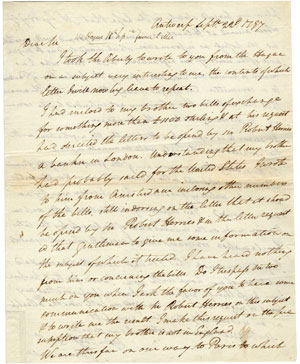 |
Marshall, John (1755-1835) Fourth Chief Justice of the Supreme Court of the United States (1801-1835). The leading Federalist of his day, he supported a stronger federal government, over the objections of the Jeffersonian Republicans, who wanted stronger state government. His court opinions helped lay the basis for U. S. constitutional law and made the Supreme Court a coequal branch of government, along with the legislative and executive branches.
Autograph letter signed, 2 pages plus integral holograph address leaf, on laid watermarked paper, Antwerp, Sept. 22, 1797. Written to Rufus King, Minister Plenipotentiary of the United States in London, as Marshall made his way to Paris on a delicate diplomatic mission which would become the famous XYZ affair. Marshall refers to a letter he had written King from the Hague, concerning some bills of exchange he had sent at his brother's request, to be opened by Sir Robert Herries, a banker in London, from whom Marshall had heard nothing. Marshall asks King to communicate with the banker and to let him know the result.
He continues: "We are thus far on our way to Paris to which place we proceed slowly in the hope that Mr. Gerry of whose arrival at Helvoet we have been informd will overtake us. We possess no information which would lead us to augur well of the result of our negotiations. A Mr. Riou who has movd to rescind the resolution referring the proposition of Partout to a committee has assignd among other reasons for the measure that the resolution had a tendency not intended by the council, to discourage & alarm the privatiers. It seems to be expected here that neither the negotiations with the Emperor nor at Lisle will terminate in peace. To day, being the anniversary of the foundation of the french republic, was celebrated in the church with music & in the fields & street by military exercises. The exhibition was by no means crouded. This is probably attributable to the deep impression made on the inhabitants of Antwerp by the late proclamation concerning their priests & external symbols. I regret very much that I cannot have the pleasure & advantage of an hour with you. I woud for that purpose have passd through England had I not apprehended that my doing so might have been considerd on both sides the atlantic as an evidence of partialities I never felt…."
Relations between the U.S. and France had been strained since Jay's Treaty with Great Britain in 1795. French privateers were harasssing American merchant ships and the two nations seemed headed for war. Marshall, along with Charles Cotesworth Pinckney and Elbridge Gerry, were dispatched to Paris to try to resolve the differences between the two countries, but French Foreign Minister Talleyrant refused to meet with them and demanded a $250,000 bribe before he would even consider normalizing relations. President John Adams was outraged and, after much urging from Republicans, who believed he had trumped up the story, released the diplomatic documents, replacing the names of the French agents with the letters X, Y, and Z. The entire nation was outraged and the slogan of the day became: "Millions for defence, but not a cent for tribute." There followed an undeclared naval war with France, known as the Quasi-War, which lasted for two years. U.S. and French negotiators restored peace with the Convention of 1800, also known as the Treaty of Mortefontaine. Under the terms of the Convention, France accepted U.S. neutrality rights at sea and discharged the U.S. from its obligations under the alliance signed with France in 1778. In return, the United States granted France most-favored-nation status as a trading partner.
Estimated Value $7,000 - 9,000.
R.M. Smythe & Co., Inc., May 11, 2000, lot 197.
View details and enlarged photos
| Realized
$11,100 |
Lot 291 |
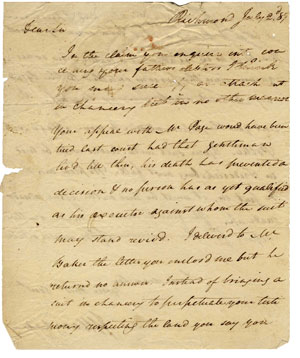 |
Marshall, John. Autograph letter signed ("Jmarshall"), 2 pages, 7¼ x 6 in., Richmond, July 2, 1789. Written on laid watermarked paper; tear at upper left margin, easily repaired and small paper loss at center left margin, affecting one word of text on verso; creasing at top right, and a few scattered pinholes. To an unnamed recipient [identified as John Hatley Norton by The Papers of John Marshall, letter included]. In 1889, Marshall, who would be appointed Chief Justice of the U.S. Supreme Court in 1801, in which capacity he would serve until his death 34 years later, was the attorney for Norton in his suit with Francis Corbin. Norton's father was the founder of a consignment merchant firm that operated in London and Virginia. Marshall writes: "In the claim you enquire into concerning your fathers debtors…Your appeal with Mr. Page would have been tried last court had that gentleman livd till then, his death has prevented a decision & no person has as yet qualified as his executor against whom the suit may stand revivd. I delivered…the letter you enclosd me but he returnd no answer. Instead of bringing a suit in chancery to perpetuate your testimony respecting the land you say you ha[ve] purchasd & paid for it woud I presume be better to bring a suit for a conveyance….Your suit with Corbin will be tried in Fredericksburg next fall. No plea can…be put in, it must be tried on the issue already made up…."
Ref: Cullen and Johnson, eds., The Papers of John Marshall, II, pp 39-40.
Estimated Value $1,200 - 1,500.
Christie's New York, Dec. 15, 1995, lot 99.
View details and enlarged photos
| Realized
$2,100 |
Lot 292 |
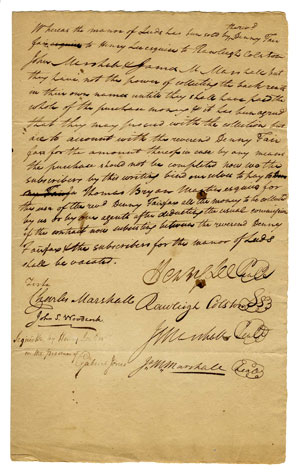 |
Marshall, John, Henry Lee, And Others. Manuscript document signed by Henry Lee, John Marshall, James M. Marshall, and Rawleigh Colston, 1 page, 12¼ x 7½ in. (Fairfax, Virginia), Aug. 5, 1793. A bond regarding the collection of back rents from a manor purchased by the four men from the Fairfax family. "Whereas the manor of Leeds has been sold by the rev.d Denny Fairfax to Henry Lee esquire to Rawleigh Colston John Marshall & James M. Marshall but they have not the power of collecting the back rents in their own names untill they shall have paid the whole of the purchase money & it has been agreed that they may proceed with the collection but are to account with the revenend Denny Fairfax for the amount thereof in case by any means the purchase shoud not be completed now we the subscribers by this writing bind ourselves to pay to Thomas Bryan Martin's esquire for the use of the rev.d Denny Fairfax all the money to be collected by us or by our agents after deducting the usual commission if the contract now subsisting between the reverend Denny Fairfax & the subscribers for the manor of Leeds shall be vacated." Docket on verso by T.B. Martin notes that "this Bond was given Aug. 5th 1793."
The Manor of Leeds in Fairfax, Virginia was named for Leeds Castle, Co. Kent, England, which was the seat of the Fairfax family. When Thomas, Lord Fairfax, came to Virginia in 1736, he laid out the Manor of Leeds and had it surveyed by John Warner before going back to England. The land comprised 119,927 acres between Hedgeman River on the upper side of Carters Run, on the branches of Goose Creek, on the lower side of the Shenandoah River below Happy Creek, including the Blue Ridge between Happy Creek Gap (now Chester Gap) and Ashby's Gap. In 1767, foreseeing trouble after the Stamp Act agitation, Fairfax conveyed various manors, including Leeds, to his nephew, Thomas Bryan Martin, who reconveyed them to him, giving him a private title as well as a seignorial title to them. After the Revolution, the private title remained good, and after Fairfax's death in 1781, the title of the lands was vested in Denny Martin.
In 1793, future Chief Justice John Marshall, his brother James Markham Marshall (who was married to the daughter of Robert Morris, "the financier of the Revolution"), their brother-in-law Raleigh Colston, and General Henry "Light Horse Harry" Lee formed a syndicate to purchase Leeds (and other manors and land) from Denny Martin and the other Fairfax heirs. The title was not cleared until 1806, making the speculation an unprofitable, and almost disastrous, one.
Estimated Value $1,500 - 2,000.
View details and enlarged photo
| Realized
$3,360 |
Lot 293 |
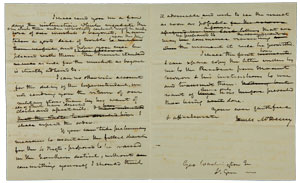 |
McHenry, James (1753-1816) Revolutionary soldier and surgeon; aide to George Washington; signer of the U.S. Constitution; Secretary of War (1796-1800). Fort McHenry in Baltimore is named after him.
Autograph letter signed as Secretary of War, 3 pages, 9½ x 7¾ in., on a bifolium, Trenton, October 5, 1798. With holograph corrrections. Addressed to George Washington, Lt. Gen. and headed "Confidential": "I have received my dear General two letters dated the 1st Inst. last night. You will have seen by the news-papers that I have sent out an advertisement inviting proposals for cloathing for the new regiments & cavalry; but I have not, as yet, been able to accomplish a like measure to supply them with subsistence. It is not however too late as contracts of this kind can be soon formed. When I mentioned my wish that it might be proper for you to express a strong sentiment to W Pickering on the subject of the apparent delay in procuring the necessary cloathing, it was to avoid giving room to W Wolcott to think I had been dissatisfied with him and expecting the same benefit from it, by reaction, as if it had been directly addressed to himself. I shall send you in a few days the instructions which regulate the use of our muskets and bayonets. I have taken a good deal of trouble upon this point, and hope you will be pleased with them. The French standard as well for the musket as bayonet is strictly adhered to." He blames the delay in the superintendent's sending the return of military stores to a lack of able clerks and assistants, then continues: "If you can take preliminary measures to ascertain the future character for the Lt Regts - proposed to be raised in the Southern district, without committing yourself I should think it advisable and wish to see the result as soon as possible…."
In 1798, the fledgling United States became involved in an undeclared naval war with France (Quasi War), with the threat of escalation into an all-out conflict. Upon McHenry's advice and under his leadership, Congress authorized the addition of twelve new regiments of regulars to the Army, and the country's scattered military garrisons were transformed into a professional, standing force. McHenry (1753-1816) had served as a staff officer to Washington and Lafayette during the Revolution, and succeeded Timothy Pickering as Secretary of War during Washington's second term as President. He continued in that office under John Adams, but continued to rely on Washington for military advice, even after Washington's retirement.
Estimated Value $3,500 - 5,000.
Sotheby's New York, May 21, 1993, lot 87.
View details and enlarged photos
| Realized
$2,220 |
Lot 294 |
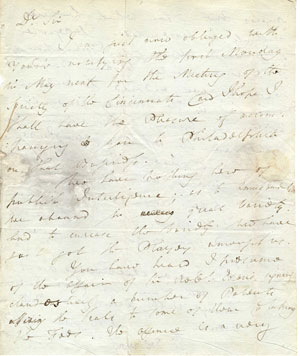 |
Paca, William (1740-1799) Signer of the Declaration of Independence from Maryland. Paca was elected to the First Continental Congress in 1774 and served until 1778, when he was appointed Chief Justice of Maryland. In mid-May of 1776, the people of Maryland passed a resolution prohibiting their delegates from voting for independence; however, the restrictions were withdrawn in June and Paca and the other delegates from Maryland voted for the Declaration of Independence. Paca is rare.
Autograph letter signed ("Wm Paca"), 2 pages (single sheet), 9¼ x 7¾ in., no place, April 20, 1784. To General Smallwood, Mattawoman (Maryland), regarding attending the first meeting of the Society of the Cincinnati and other news. Moderate soiling and scuffing; some fading to ink, not affecting legibility. Paca writes, in part: "I am just now obliged with your's notifying the first Monday in May for the Meeting of the Society of the Cincinnati and I hope I shall have the pleasure of accompanying you to Philadelphia on that Business….You have heard I presume of the affair of Sir Robt Eden's signing clandestinely a number of Patents affixing the Seale to some of those….The offense is a very serious one & for which he will certainly be prosecuted…. I was rejoiced to read your letter as it assures me that you are not dead; for so you have been reported…."
Sir Robert Eden (1741-1784) was the last Royal Governor of Maryland. William Smallwood (1732-1792) was a Major General in the American Revolutiuon. He joined Washington's Army (July 10, 1776) in New York, as commander of the Maryland Battalion; actively engaged in the battles of Brooklyn Heights and white Plains, after which Congress appointed him Brigadier General for his gallantry. Smallwood won new laurels for action at Camden, receiving the thanks of Congress. In September, 1780, he was appointed Major General, but after the removal of General Horatio Gates, he refused to serve under Baron von Steuben.
The Society of the Cincinnati was organized May 10, 1783, before the Treaty of Peace was signed and before the British evacuated New York. The Society was established with a charter stating three purposes: to preserve the rights and liberties for which its founders had fought, to promote the national honor and "dignity of the American Empire," and to reinforce the "cordial affection" among its members by providing aid and assistance to them and their families when in need. The first military beneficial society, The Cincinnati worked to influence Congress for pensions for surviving Revolutionary veterans. Original membership was limited to those officers who had served a minimum period with the regular (Line) American Army or Navy; or with the French forces under Rochambeau or deGrasse; those who had served to the end of the War as a Line Officer, resigned with honor after at least three years of service, and/or had been rendered supernumerary, or honorably discharged after three years of service (today, descendants of original members may also become members). George Washington served as The Cincinnati's President General from its inception until his death in 1799.
Estimated Value $2,000 - 3,000.
Remember When Auctions, July 18, 1998, lot 47; personal papers of William Smallwood.
View details and enlarged photos
| Realized
$5,520 |
Lot 295 |
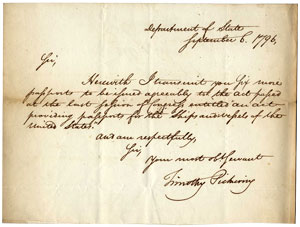 |
Pickering, Timothy (1745-1829) Statesman from Massachusetts, Revolutionary War officer; he served as U.S. Postmaster General (1791-1795), Secretary of War (1795), and Secretary of State (1795-1800), all under George Washington. Autograph document signed as Secretary of State, one page, 6 x 8 in., Department of State, Sept. 6, 1796. "Sir; Herewith I transmit you six more passports to be issued agreeably to the act passed at the last session of Congress entitled "an act providing passports for the Ships and vessels of the United States." John Adams dismissed Pickering after he came into office. Boldly penned and signed. Mounting traces on verso, affecting one of two dockets.
Estimated Value $350 - 450.
View details and enlarged photo
| Realized
$120 |
Lot 296 |
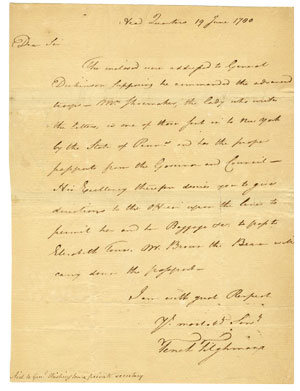 |
Tilghman, Tench (1744-1786) American Revolutionary war officer; aide de camp and private secretary to General George Washington. Autograph letter signed, 1 page, on laid watermarked paper, 10 3/8 x 7 7/8 in., Head Quarters, June 19, 1780. To an undisclosed recipient. "The inclosed [not present] were addressed to General Dickinson supposing he commanded the advanced troops. Mrs. Shoemaker, the lady who writes the letters, is one of those sent in to New York by the State of Penna. and has the proper passports from the Governor and Council. His Excellency therefore desires you to give directions to the officer upon the lines to permit her and her Baggage &c. to pass to Elizabeth Town. Mr. Brown the Bearer will carry down the passport." Tape reinforcement to folds on verso, else fine.
Together with a document signed by James Parker, 1 page, 12 x 7 ¼ in., "Parsipany," Dec. 21, 1778. Toned, with edge splits; integral address leaf with seal remnants. To Deputy Quartermaster General Col. James Abeel (1733-1835) in Morristown, pleading to buy "four locks & half a dozen pounds of steel for which I shall be glad to pay you any price you will ask…."
Estimated Value $500 - 600.
View details and enlarged photo
| Realized
$1,320 |
Lot 297 |
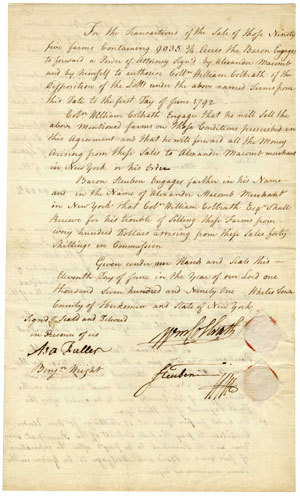 |
Von Steuben, Baron Friedrich Wilhelm (1730-1794) Prussian officer who successfully reorganized and trained the Continental Army.; he wrote a manual of military training and procedure which remained the official U.S. military guide until 1812. Document signed ("Steuben"), 1 page, 12¼ x 7¼ in., Whites Town, County of Herkemer, State of New York, June 11, 1791. Articles of Agreement between Baron von Steuben and William Colbarth, Sheriff of the County of Herkemer. The document details the arrangements whereby Colbarth is to sell or lease ninety-five farms, containing 9035¾ acres, on von Steuben's behalf. "…The Baron engages to forward a Power of Attorney signed by Alexander Nacomb, [Merchant of New York] and by himself to authorise…the Disposition of the Lotts… and Shall receive for his trouble…from every hundred Dollars arising from these sales forty shillings in commission." Signed by both parties, with seals and two witnesses. Affixed to another sheet at upper edge.
Estimated Value $800 - 1,000.
View details and enlarged photo
| Realized
$990 |
Lot 298 |
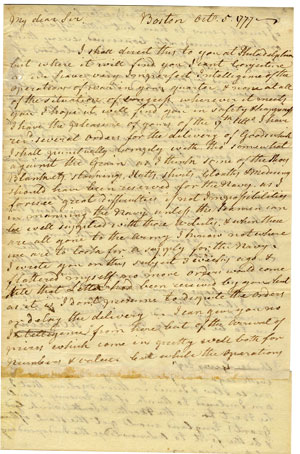 |
Warren, James (1726-1808) President of the Massachusetts Provincial Congress; Paymaster General of the Continental Army during the American Revolutionary War; husband of Mercy Otis Warren.
Excellent war-content autograph letter signed ("J Warren") as Paymaster General of the Continental Army, 2 pages, 11 x 7 in., Boston, October 5, 1777. To Signer of the Declaration from Massachusetts, Elbridge Gerry. James Warren (not to be confused with brothers Joseph and John Warren), writes:" My Dear Sir, I shall direct this to you at Philadelphia but where it will find you I cant Conjecture as we have very Imperfect Intelligence of the operations of war in your quarter & none at all of the situation of Congress. Wherever it meets you I hope it will find you in safety & happiness….I have recd several orders for the delivery of Good which I shall punctually Comply with, tho' somewhat against the Grain as I think some of the Shoes, Blankets, stockings, Hatts, shirts, Cloaths, & Medicine should have been reserved for the Navy, as I foresee great difficulties if not impossibilities in manning the Navy unless the Seamen can be well supplied with these Articles. & when these are all gone to the Army I know not where to look for a supply for the Navy…I can give you no Intelligence from here but of the Arrival of prizes which come in pretty well both for Numbers & values but while the Operations by Land are so very Important that kind of success seems to have but little Effectiveness on those Immediately Concerned. Everything is Absorbed in the Anxious Expectation of great Events from the Armies. You will have heard before this reaches you of an Expedition to Rhode Island. The men are all arrived & in sufficient Numbers. It is expected they will go in 2 or 3 days. What the Event will be time must determine. It very much depends on vigorous measures, & sound Judgment. Nothing decisive has yet taken place in the Northern department tho' we have long Expected it. They want neither for Numbers or Confidence in their Generals, or Indeed for any thing else but some how my hopes are not so sanguine as they have been. I begin to Apprehend Burgoyne will find his way back to Ti[conderoga] & we shall never again catch him on such dangerous Ground. As the reputation of the N England Arms as well as the Interest of the Common Cause are engaged in this matter I am perhaps more Anxious & Apprehensive than I should otherwise be….J Warren"
Warren pasted a piece of paper to the bottom of his letter and added a postscript: "with regard to foreign affairs, France & Spain are so slow & Timid in their motions that I am Inclined to think if the Enemy should be Beat in the North & South (which God Grant) England would get the start of them & be the first to Acknowledge the Independency of America."
Less than two weeks after this letter was written, General John Burgoyne (1722-1792) was captured with his entire army of 6200 men at Saratoga on October 17, 1777. Most historians believe this was the major turning point in the War for Independence. It was the American victory at Saratoga that convinced King Louis XVI of France to enter into negotiations with the Americans, resulting in a formal Franco-American alliance and French entry into the war.
Estimated Value $2,500 - 3,000.
Sotheby's New York, Sale 7394, lot 166.
View details and enlarged photos
| Realized
$5,040 |
Lot 299 |
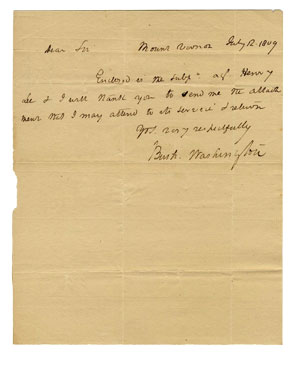 |
Washington, Bushrod (1762-1829) Nephew of George Washington and U.S. Supreme Court associate justice (1798-1829). He inherited Mount Vernon from George Washington in 1799. Autograph letter signed ("Bush. Washington"), 1 page, Mount Vernon, July 12, 1809. To an unknown recipient regarding a document pertaining to his nephew Richard Henry Lee Washington, son of Bushrod's brother Corbin, who had died in 1800. Bushrod says, "…I will thank you to send me the attachment that I may attend to its service & return." Bushrod and Corbin were sons of George Washington's brother, John Augustine Washington. Corbin and his wife died in 1800 and when Henry Lee, who was one of three sons, came of age in 1810, his parents' estate was inventoried so he would receive one third of it. This document may pertain to that estate inventory.
Estimated Value $300 - 500.
View details and enlarged photo
| Realized
$192 |
Lot 300 |
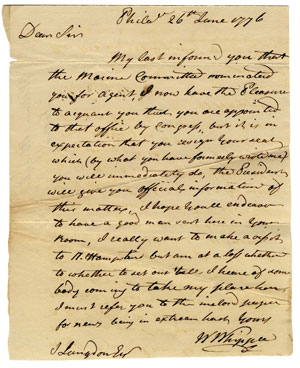 |
Whipple, William (1730-1785) Signer of the Declaration of Independence from New Hampshire; he was a member of the Continental Congress (1976-79). Autograph letter signed ("W Whipple"), 1 page, on laid paper, 8¼ x 6½ in., Philadelphia, June 26, 1776. Wear to diagonal folds. To John Langdon, member of the First Continental Congress from New Hampshire, informing him that he has been appointed agent for the Marine Committee: "Dear Sir My last informed you that the Marine Committee nominated you for agent, I now have the pleasure to acquaint you that you are appointed to that office by Congress, but it is in expectation that you resign your seat which (by what you have formally wrote me) you will immediately do, the President will give you official information of this matter, I hope you'll endeavor to have a good man sent here in your Room, I really want to make a visit to N. Hampshire but am at a loss whether to set out till I heare of somebody coming to take my place here. I must refer you to the inclosed paper for news being in extream hast." Langdon resigned from Congress and supervised the construction of numerous battleships. In 1787, he rejoined the Continental Congress and became a representative to the Constitutional Convention. He served in the U.S. Senate from 1789 to 1801 and later became Governor of New Hampshire.
The newspaper Whipple sent to Langdon is present: The June 29, 1776 issue of The Pennsylvania Ledger: Or the Virginia, Maryland, Pennsylvania, and New-Jersey Weekly Advertiser, 4 pages. The paper includes news of the state of affairs in the colonies, as well as an extraxct from Thomas Paine's Common Sense.
Estimated Value $4,000 - 6,000.
View details and enlarged photo
| Realized
$11,100 |
Lot 301 |
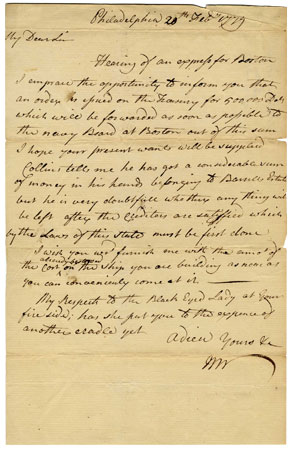 |
Whipple, William. Autograph letter signed ("WW"), 1 page, on laid watermarked paper, 11½ x 7¼ in., Philadelphia, Feb. 20, 1779. Center horizontal fold is separated; other small edge chips and splits, easily repaired. To an unidentified recipient, on Continental Congress business: "Hearing of an express for Boston I embrace the opportunity to inform you that an order is issued on the Treasury for 500,000 Dols which will be forwarded as soon as possible to the navy Board at Boston out of this sum. I hope your present wants will be supplied. Collins tells me he has got a considerable sum of money in his hands belonging to Barnes Estate but he is very doubtfull whether any thing will be left after the creditors are satisfied which by the Laws of this state must be first done. I wish you wd furnish me with the amo[un]t of the cost already bestowed on the ship you are building as soon as you can conveniently come at it. My Respects to the Black Eyed Lady at your fireside; has she put you to the expence of another cradle yet…."
Estimated Value $1,600 - 2,000.
View details and enlarged photo
| Realized
$2,520 |
Lot 302 |
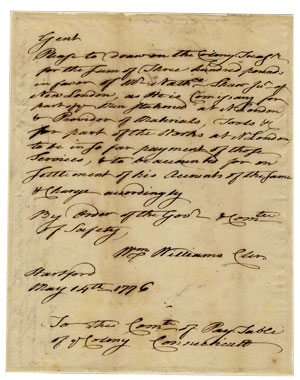 |
Williams, William. Williams, William (1731-1811) American merchant and politician; signer of the Declaration of Independence from Connecticut. Autograph document signed ("Wm Williams"), 1 page, 8 x 6 in., Hartford, May 14, 1776. A letter from a Connecticut Signer in the magic year of 1776, less than two months before the signing of the Declaration. "To the Comtte of Pay Table of ye Colony of Connecticut". Williams orders: " Please to draw on the Colony Treasury for the sum of Three hundred pounds in favor of Nathl Shaw Junr of New London, as he is Commissary for part of ye men stationed at N London to Provider of Materials, Foods, for part of the works at N London to be in…payment of those services, & to be accounted for on Settlement of his accounts & charge accordingly. By Order of the Comtee of Safety, Wm Williams Chr."
With an autograph endorsement signed by William Ledyard (1738-1781), also dated May 14, 1776. Ledyard was a Lieutenant in the Connecticut Militia and was in command of Fort Griswold when it fell to the British under Benedict Arnold in 1781. After refusing to surrender with his small force against a trained British force four times the size of his, the British finally stormed the fort and took 80 more lives, even though Ledyard offered his sword to the commander, Major Bromfield.
In 1776, Williams was elected to the Continental Congress to replace Oliver Wolcott, who, certain that the vote for the Declaration would be affirmative, had returned home for an overdue visit. Williams arrived too late to vote for Independence, but signed the engrossed Declaration. He was appointed a member of the committee to frame the Articles of Confederation and in 1787, he attended the Hartford convention, where Connecticut ratified the Federal Constitution.
Estimated Value $1,750 - 2,250.
R.M. Smythe & Co., May 11, 2000, lot 17.
View details and enlarged photos
| Realized
$4,320 |
|
|